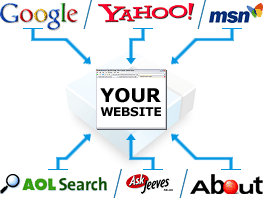
Story highlights
1. Compare PPC and SEO benefits
2. Who is PPC for?
3. Reassure prospect








Hello. Compare PPC and SEO. After you’ve told the client about the two basic types of search marketing, probably the next question on their mind will be: “Is one approach better than the other?” Here’s a couple pictures to illustrate the strong points of SEO and PPC.
Help each other figure out what they mean. Test each other on the information provided on your cards.
SEO



PPC





Task 1. Read the text below about the differences between PPC and SEO. Try to memorize as much of it as you can in 5 minutes. Then we’ll try to reconstruct the text all on our own.
IS ONE APPROACH BETTER THAN THE OTHER?
That depends on what you’re trying to achieve.
Paid placement or PPC is the quickest and most effective way to get attention and listing on the search engines. It is a simpler concept to understand and, unlike many marketing activities, the return can be calculated accurately. It also has the potential to give business owners and managers an immediate hit.
PPC is ideal for launching seasonal or targeted campaigns (such as new product launches, event-related promotions like Valentine’s Day, Christmas or Father’s Day, limited time offers and geographically targeted promotions).
Natural placement (SEO), on the other hand, gets you more visitors. Natural results are statistically more popular, used more often and are much more cost effective over the long run. While they take longer to achieve (up to 3 months), it is all worth the effort.
Various studies show that a prospective buyer will use organic (=natural) searches 60% - 80% of the time. Natural search results gather up to six times more clicks than paid advertising. This is because buyers tend to trust search engines more than the advertisers. Whereas the effects of paid placement wear off quickly, organic search marketing has a real impact in the medium to long term, provided efforts are maintained. Many companies will find the longevity and substance of organic search a real benefit.
All in all, the best marketing campaigns combine both approaches because each presents different strengths that work well together. PPC is faster, while SEO gets you more visitors and works for you better in the long run.
Task 2. Who is PPC for? Here’s the key PPC benefits again, but tied to the type of customers who need them.Insert the phrases.
1. allows you to
2. guarantee position
3. new to the market
4. on a keyword by keyword basis
5. relatively inexpensive
6. run a seasonal promotion
7. strongly recommend that
8. take months to
9. well suited to the needs of
Pay Per Click (PPC) is for you if …
1. If you have a small budget
Since it’s precisely measurable and ……………………………., it’s very ………………………….. small and midsize firms
2. If you don’t have months to wait for SEO results
E.g. if you want to ………………………………… or launch a new product, you need PPC. SEO can be very effective if done well but cannot ………………………….. and can …………………………….. have an impact on your search engine positions. If your business is ………………………………………., your site has been re-designed or launched recently, you can’t afford to wait months either.
3. If you don’t know what keywords will work for your business
We ………………………………….. you start with paid search. This ………………………………. test a large number of keywords, and to measure the results …………………………………………. This information can then be used when optimizing your website for search engines..
Task 3. Recap benefits. To finish the negotiation with the prospect, recap the benefits of PPC by heart. Below you’ll see keywords to help you ('targeted' goes for SEM in general).
1. Targeted
2. Fast
3. Affordable
4. Measurable
Task 4. Reassure prospect about PPC. Finally, reassure the prospect that their business is going to benefit from PPC. Use the phrases below.
1. target market, find you
2. dramatically improve, rankings
3. direct, targeted traffic, website
4. put you, far ahead, competition
Sources:

Ajánlott bejegyzések:
A bejegyzés trackback címe:
Kommentek:
A hozzászólások a vonatkozó jogszabályok értelmében felhasználói tartalomnak minősülnek, értük a szolgáltatás technikai üzemeltetője semmilyen felelősséget nem vállal, azokat nem ellenőrzi. Kifogás esetén forduljon a blog szerkesztőjéhez. Részletek a Felhasználási feltételekben és az adatvédelmi tájékoztatóban.
kisdobos 2008.02.13. 17:41:56
Solutions to Task 2.
1. relatively inexpensive
2. well suited to the needs of
3. run a seasonal promotion
4. guarantee position
5. take months to
6. new to the market
7. strongly recommend that
8. allows you to
9. on a keyword by keyword basis
Pay Per Click (PPC) is for you if …
1. If you have a small budget
Since it’s precisely measurable and relatively inexpensive, it’s very well suited to the needs of small and midsize firms
2. If you don’t have months to wait for SEO results
E.g. if you want to run a seasonal promotion or launch a new product, you need PPC. SEO can be very effective if done well but cannot guarantee position and can take months to have an impact on your search engine positions. If your business is new to the market, your site has been re-designed or launched recently, you can’t afford to wait months either.
3. If you don’t know what keywords will work for your business
We strongly recommend that you start with paid search. This allows you to test a large number of keywords, and to measure the results on a keyword by keyword basis. This information can then be used when optimizing your website for search engines..
Solutions to Task 3.
TARGETED. Reach people looking for your product or service.
FAST. See your ads on Google within minutes of creating them
AFFORDABLE. Pay only for clicks, and control your spending by setting a maximum budget.
MEASURABLE. Test keywords and get data on exactly which dollars are the most productively spent
Solutions to Task 4.
With a combination of PPC and SEO you can make sure your target market will find you.
You can dramatically improve your search engine rankings and direct quality, targeted traffic to your website.
It could put you far ahead of the competition.